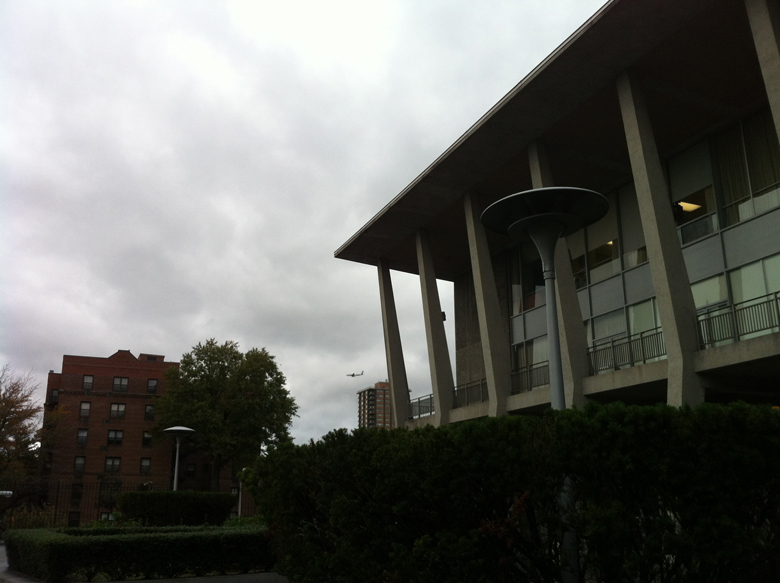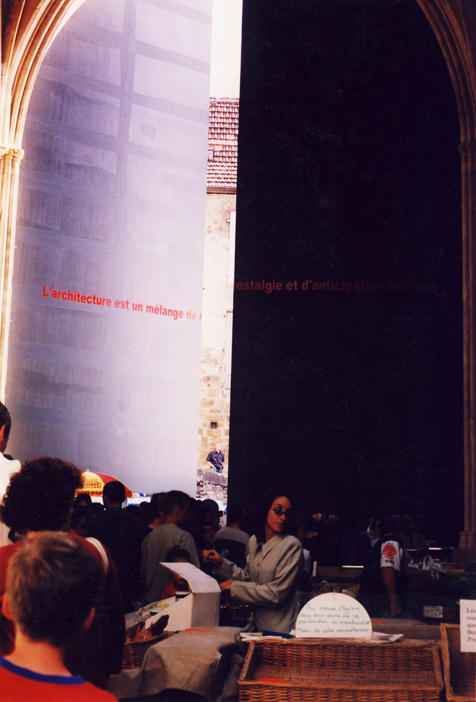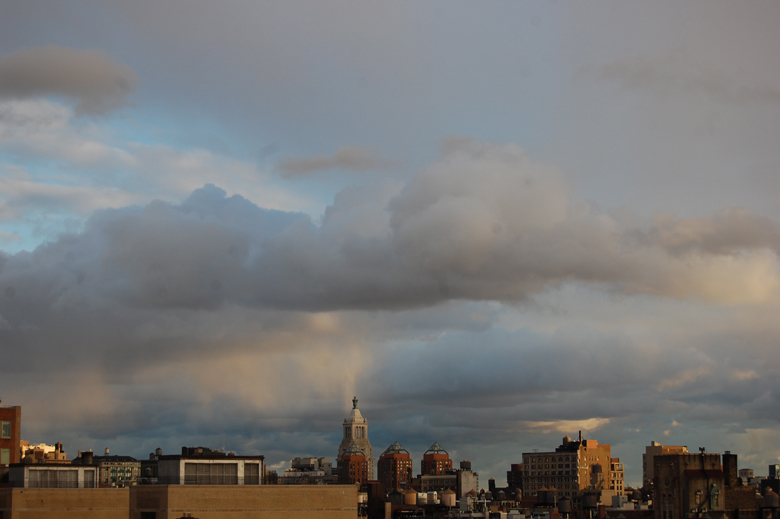LXI
How then, to begin the great work of desaturation?
Or must things need “fall apart”?
I went down where the vultures feed
I would’ve gone deeper but there wasn’t any need…
Wrote Dylan oncet in “Dignity.”
How can we let meaning pass through the material of our language? How can we open up, desaturate the writing? How can our writing be empty enough to be filled – so that the work can remain continuously at work?
I have already noticed in the works of the Orientals, drawing the empty spaces left around the leaves counted as much as the drawing of the leaves themselves. In two adjoining branches, the leaves or one branch were more in harmony with the ones of its neighbor than with the leaves of the same branch… When inspiration has taken leave of the object, observe the empty spaces between the branches. Observation having no immediate, direct relation to the object. [From Henri Matisse, Écrits et propos sur l’art, ed. Dominique Fourcade (Paris: Hermann, 1972), p. 168.]
All roads follow.
So if you want to, go father, even unto the doorway of the Mysterious Female:
The base from which Heaven and Earth sprang,
there within us all the while;
Draw upon it as you will, it never runs dry.
[adapted from Waley, The Way and Its Power, p. 141]
Zhao Mengfu (1254-1322), the first painter on record to merge painting and writing observed that in drawing rocks is necessary to use the “flying white (or ‘blank’)” method, where, in cursive script, the bristles of the brush separate so that the strokes contain streaks of uninked paper. Jullien, in The Great Image… writes that from the technical point of view of manipulating the brush, pictorial emptiness is… associated with the long-proven practices of the Chinese art of writing, whether with the “dry brush” (ganbi) saturated with only a little ink, or with the “worn” brush, whose sparse hairs leave a blank space in the middle. That “flying blank” (feibai) left across the drawing by the lively motion of the brush relieves the weight of the figuration and makes the internal energy that deploys it pass from one end to the other. In literary criticism, that same notion of a “flying blank” will metaphorically serve to evoke the “emptiness between words” and the allusive quality of poetic meaning.
Thus, communication can permeate the work, both filling and emptying it with “spiritual-animating breath.”
Athens, we’ve got a problem.
For already, in Parmenides’ Nature, we have two “ways.”
Excessive thinking disorders the mind. Or, put another way, a disordered mind indicates excessive thought or sense-perception.
When one’s sense-perception is utterly overwhelmed, particularly when one is a child, it is commonly called trauma. But the experience is perhaps more accurately described as “the forced-open gate.” Often this is only survived via dissociation, voluntary or otherwise. Such dissociation may become part of the person’s permanent internal structure. And, paradoxically, trigger an ongoing de-structuration of the self, the “I.”
How to address this? Psychotherapy, of course. Among other modalities of shifting awareness. But there can also be also great efficacy, to the degree of “healing” possible, found in the incremental process of aligning the body, limbs, vital energy and mind: in short, via a gradual process that makes accessible an internal “room” animated by ever-circulating breath.
A man, a plan, an obsession. Not a palindrome. Not even. Uh oh.
Excess impedes access.
Aletheia: truth, disclosure, unclosed, unconcealedness, the state of not being hidden, the state of being evident.
Heidegger, in Being and Time cites the production of the vase as “the very modality of aletheia… the movement of truth’s self-manifestation, inasmuch as, through that vase, ‘something hidden arrives in the nonhidden.’” [Jullien, …Image… p. 81.]
You say you want a revolution?
Yes, of the hub, of the vital breath, of the wheel that turns so the potter can empty the vase. Even, and most especially, of meaning.
From awareness to the word to implementation (action) to order. So the water wheel turns. Awareness taking shape and constituting itself as word.
The hub, the vase, the room: all require emptiness to work.
“’Let the sparse and the dense alternate, let emptiness and fullness engender each other,’ advises the Chinese manual, and you will have grasped ‘the logic of painting.’” Jullien is careful to point out that “Emptiness is not an entity, not even a negative one (nothingness); it is an operative force… [Emphasis mine.]
“All the same, [modern] European painting [works] its two resources, form and color, without respite, in order to open then, even force them, [like the held-open gate] beyond themselves, it modifies proportions, stretches bodies [Yoga!] purifies lines, in short liberates form from the weight and mutism in which an accurate (but impossible) representation would tend to enclose it. By deforming form, that is by working it against its submission to realism, by emancipating it from any objective reference and making it ‘abstract,’ European painting detaches form, promotes it, and spiritualizes it. Cézanne breathes life into his Bathers through the ascending motion of the triangle. According to Wassily Kandinksky, ‘the more organic form is pushed to the background, the more abstraction moves to the foreground’ and gains in spiritual resonance.” [The Great Image… pp. 85-88.]
Pole, pole, pole your boat
Gently up the stream…
In the market town of Sarlat, some of the market moved indoors to a deconsecrated twelfth century church. Across the inside of the massive, brushed steel doors, courtesy of the imagination of Jean Nouvel, runs, in Chinese red, this quote from Baudrillard: L’Architecture est un mélange de nostalgie, et d’anticipation extrème. [Architecture is a mix of nostalgia and extreme anticipation.]
All architecture is what you do to it when you look upon it, said Whitman.
(Did you think it was in the white or gray stone? or the lines of the arches and cornices?)
[Leaves of Grass, Book XV,“A Song for Occupations”]
Which thoughts cross your mind on the day of the official opening of One World Trade Center which tout le monde, or nearly so, persists in calling the Freedom Tower. It is said in the press that the building cost $3.9 billion. Such circumspection with regard to scale of investment! Such modesty, such economic rigor to rein it in shy of a full $4 bil. And mirroring this virtuous lack, the hollow of the space itself. Well, that may take some time to fill.
anything@all.zom
Who, or more accurately, what, killed the kidneys?
The words swirl around you having spilled over from the adjoining café table. “They’re just a feed company.” “My conversions are stuck.” Data. “Bazillions dot com.” Optimize. Slowly, sip by sip, you realize that you do and don’t understand what these two male creatures, who look in most essential ways remarkably like you, are saying, and further, that the hum from which these words emerge puts a whole new gloss on the idea of Other Englishes.
Say it in Zombish.
Ontology be nihilism.
Sister Writer: by putting words on paper in a particular order, you open pathways along which reality may deploy. Therefore, even as you create distinctions, maintain in the spirit of your language something of the undifferentiated.
“Emancipation from the concrete will follow,” writes Jullien, “but with no abandonment of the concrete; the de-concretion coming about through emptiness and desaturation will not lead to abstraction.”
What springs to hand, grasp it.
That which is incoherent cannot be regulated. It simply self-annihilates.
The digital: forced concretization of the abstract.
And Aeneas’ ships, transform’d into naiads.
Same ship, different day.
…the wood lost firmness and turned into flesh;
the curved prows changed to heads; oars turned to toes
and swimming legs, what had been sides still were,
and keels remained, though they were changed to spines…
[according to Martin’s translation of Ovid’s M.]
Their rigidity softened, and their wood turned to flesh; the curved sternposts turned into heads; the oars into fingers and legs, swimming; the sides of each vessel became flanks, and the submerged keel down the ship’s middle turned into a spine; the cordage became soft hair, the yards were arms; and their dusky colour was as before.
[according to A.S. Kline’s translation]
Whereas for Martin, “their cerulean color stayed the same.”
I change but I cannot die.
Shelley said that, one cloudy day.
Gradual school. It confers no degrees, yet somehow grants efficacy. How mysterious!
Desperation being a reliable symptom of incoherence.
Yet somehow the greater movement is toward Cybele rights.
Cutting the Gordian knot at Khartoum.
Nileism: a history runs through it.
To the sea, the biggest noplace on earth.
Hey Sailor, what ship?
Outopia, mon amour.
The vessel. The vase.
How is it possible for us to say certain words, England, for instance, without gagging?
The great orphanage has no exit.
Punchdrunk, or just drunk?
Brother Writer: The verb is interstitial, but it’s where the action is. Hence in English writings the verb is often found to be overactive, or dead.
“Let us forget things, let us consider only relationships,” proposed Braque.
Between, that outopia, being the long-sought modality of the nonontological that eluded the great European discoveries and certainly could not be colonized.
Marvelously because naturally.
Lodgings: the temporary, hospitable dwelling place that is not a residence. We shall have recourse to return to this word again.


